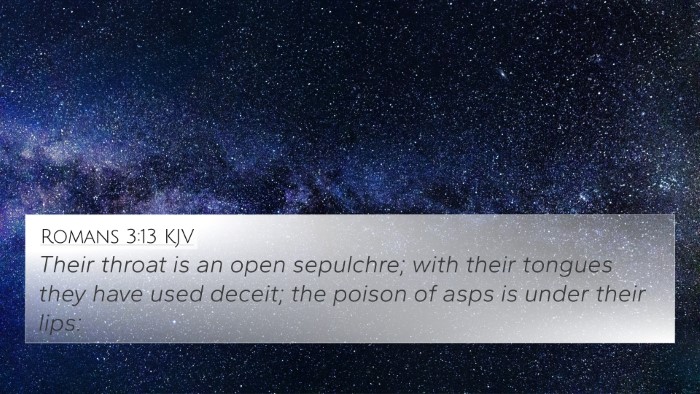Understanding Jeremiah 5:16
The verse Jeremiah 5:16 reads: "Their quiver is as an open sepulcher, they are all mighty men." This verse metaphorically captures the devastating impact of false prophets and the moral decay present in Judah during Jeremiah's time. The imagery of a quiver as an open grave emphasizes the destruction and death that their supposed strength brings to society.
Summary of Insights from Public Domain Commentaries
According to Matthew Henry, this verse illustrates the futility of relying on human strength and the corrupt nature of the leaders in Judah. Henry emphasizes that the leaders, instead of being a source of life, bring death to the people with their deceitful messages.
Albert Barnes highlights the metaphor of the quiver as a representation of the way these leaders hold back the potential dangers—swords of hypocrisy and deceit. The "mighty men" he refers to are those who use their strength not to protect but to oppress.
Adam Clarke elaborates on the term "sepulcher," which signifies a place of decay. This can suggest that the leaders' intentions, though they may appear noble, are ultimately leading to the downfall of their society, encapsulating the duality of strength versus the rottenness of purpose.
Cross-References and Thematic Connections
This verse connects with several other Bible passages, creating a broader understanding of its message. Here are some related verses:
- Jeremiah 9:21 - Speaks about the fall of the inhabitants and the repercussions of their choices.
- Isaiah 5:14 - Discusses how hell has enlarged itself to receive the sinful, echoing the deathly consequence of false leadership.
- Ezekiel 22:26 - Mentions priests who violated God's law, similar to the corrupt leaders Jeremiah critiques.
- Matthew 23:27 - "Woe to you, scribes and Pharisees," demonstrating the New Testament parallel to Jeremiah’s lament about hypocritical leaders.
- James 3:1 - A warning about teaching and leadership responsibilities connects the themes of speech and the resulting consequences.
- Proverbs 14:34 - Highlights righteousness and its effects on a nation, contrasting with the decay mentioned in Jeremiah.
- Micah 3:1-3 - A further critique of corrupt leadership, comparing prophetic calls to that of Jeremiah.
Connections between Scriptures and Thematic Analysis
The overarching theme present in these verses is the dire consequences of misguided leadership. The motif of "death" as a consequence of poor guidance features predominantly in each referenced passage. This inter-Biblical dialogue encourages readers to view the divine judgment and correction consistently throughout the Scripture. The thematic connections draw attention to the necessity for righteous leaders and the dangers of arrogance and false security.
Tools for Bible Cross-Referencing
To delve deeper into the interconnections within Scripture, consider utilizing:
- Bible Concordance: A tool that assists in locating passages based on specific keywords.
- Bible Cross-Reference Guide: Helps in finding links between verses systematically.
- Cross-reference Bible Study: Structured methods for analyzing cross-references across different texts and themes.
- Bible Reference Resources: Compilations or directories that provide guiding links between scriptures.
Benefits of Cross-Referencing in Study
Incorporating cross-referencing can significantly enhance one's understanding of Biblical text. By linking Bible scriptures, individuals can:
- Identify connections between Old and New Testament teachings, deepening the understanding of continuity in God's revelation.
- Engage in comparative Bible verse analysis, revealing insights through parallels and contrasts.
- Facilitate sermon preparation by incorporating broader scriptural context, enriching the application of Biblical truths.
Conclusion
The verse Jeremiah 5:16 serves as a profound reminder of the consequences of hypocrisy and the importance of righteous leadership in the faith community. By understanding its connection with other scriptures and utilizing effective tools for cross-referencing, readers can uncover rich layers of meaning and application in their spiritual journey.





